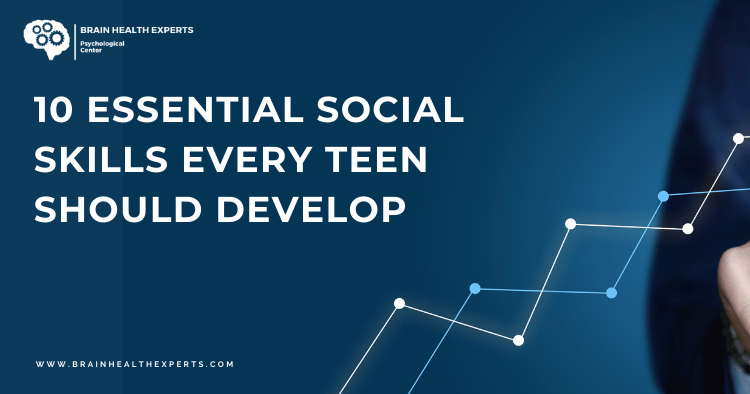Table of Contents
- Understanding Social Skills
- Active Listening
- Effective Communication
- Empathy
- Conflict Resolution
- Body Language Awareness
- Building Trust
- Teamwork and Collaboration
- Respecting Boundaries
- Adaptability
Understanding Social Skills
Social skills are the tools we use to communicate and interact with others. For teens, developing strong social skills is crucial as they navigate friendships, romantic relationships, and various social settings. Understanding these skills helps enhance self-esteem and fosters positive interactions, contributing to overall mental and emotional well-being. Additionally, these skills are critical in the workplace, as highlighted in our article on top 10 essential workplace mental health resources for 2024.
“Social skills are not just about talking—it’s about connecting.”
FAQs
- Why are social skills important for teens? Social skills help teens build meaningful relationships and improve their self-confidence.
- How can poor social skills affect a teen? Poor social skills can lead to feelings of isolation, anxiety, and difficulty in forming friendships.
Active Listening
Active listening is more than just hearing; it’s about fully engaging with the speaker. This skill involves nodding, making eye contact, and summarizing what the other person says to show understanding.
Tips for Active Listening:
- Maintain Eye Contact: This shows you are focused and interested.
- Avoid Interrupting: Let the speaker finish before you respond.
- Ask Clarifying Questions: This demonstrates your interest and helps prevent misunderstandings.
“Listening is an art that requires attention over talent.”
Visual Element: Active Listening Techniques
| Technique | Description |
|---|---|
| Paraphrasing | Restating what was said in your own words |
| Non-Verbal Cues | Using gestures and facial expressions to show engagement |
| Summarizing | Recapping the main points of the conversation |
Effective Communication
Effective communication encompasses both verbal and non-verbal messages. Teens should learn to express their thoughts clearly and respectfully. This is particularly important for reducing stress in communication, as discussed in our article on 10 positive thinking techniques to reduce stress.
Key Components:
- Clarity: Use simple language and get to the point.
- Tone of Voice: Be mindful of how your tone affects your message.
- Open-Ended Questions: Encourage deeper discussions by asking questions that require more than a yes or no answer.
“Communication is the bridge between confusion and clarity.”
Empathy
Empathy is the ability to understand and share the feelings of others. It is a fundamental social skill that strengthens bonds and fosters compassion. The importance of empathy is also emphasized in effective emotional intelligence, which is crucial for building strong relationships.
Ways to Cultivate Empathy:
- Practice Perspective-Taking: Try to see situations from others’ viewpoints.
- Engage in Community Service: Volunteering can provide insights into different life experiences.
FAQs
- How does empathy affect relationships?
Empathy helps build trust and connection, making relationships stronger. Refer to our article on 10 ways emotional intelligence strengthens relationships for more insights.
“Empathy is about finding echoes of another person in yourself.”
Conflict Resolution
Learning how to resolve conflicts constructively is essential for maintaining healthy relationships. Teens can benefit from understanding the steps involved in conflict resolution, which also plays a role in developing resilience, a key theme in our article on 10 effective strategies for building resilience in mental health.
Steps to Resolve Conflict:
- Identify the Issue: Determine what the disagreement is about.
- Express Feelings: Share how the conflict affects you without blaming others.
- Find Common Ground: Look for solutions that satisfy both parties.
“Conflict is inevitable, but combat is optional.”
Body Language Awareness
Body language plays a significant role in communication. Teens should be aware of their own body language and how to read others’. Understanding non-verbal cues can greatly enhance their communication skills.
Important Aspects:
- Facial Expressions: Smiling can convey friendliness, while crossed arms might suggest defensiveness.
- Posture: An open posture signals receptiveness and confidence.
Visual Element: Body Language Tips
| Gesture | Meaning |
|---|---|
| Smiling | Friendly and approachable |
| Leaning Forward | Engaged and interested |
| Crossed Arms | Defensive or closed off |
“Your body language may be more eloquent than your words.”
Building Trust
Trust is the foundation of any relationship. Teens can build trust through consistency, honesty, and reliability. The importance of trust is echoed in emotional intelligence, as discussed in our article on top 5 ways to measure your emotional intelligence effectively.
Tips for Building Trust:
- Be Honest: Always communicate truthfully.
- Follow Through: Keep promises and commitments.
FAQs
- What happens when trust is broken?
It can take time to rebuild, but open communication and effort can help restore it.
“Trust takes years to build, seconds to break, and forever to repair.”
Teamwork and Collaboration
Teamwork is a vital skill in both academic and social contexts. It involves working together towards a common goal and understanding the strengths of each member. This is also crucial for workplace success, as explored in our article on 10 ways positive thinking boosts workplace success.
Strategies for Effective Teamwork:
- Share Responsibilities: Divide tasks based on individual strengths.
- Encourage Participation: Ensure everyone has a voice in the group.
“Teamwork is the secret that makes common people achieve uncommon results.”
Respecting Boundaries
Understanding personal boundaries is crucial for healthy interactions. Teens should learn to identify and respect their own boundaries and those of others.
Tips for Respecting Boundaries:
- Communicate Your Limits: Be clear about what makes you comfortable or uncomfortable.
- Listen to Others: Pay attention when someone expresses their boundaries.
“Boundaries aren’t meant to keep people out; they’re meant to protect what’s inside.”
Adaptability
Life is unpredictable, and being adaptable can make navigating social situations easier. This skill involves being open to change and adjusting to new circumstances.
Ways to Improve Adaptability:
- Stay Open-Minded: Be willing to consider different perspectives.
- Practice Flexibility: Try new things and step out of your comfort zone.
“The measure of intelligence is the ability to change.”
Developing these essential social skills can significantly impact a teen’s life. By fostering these abilities, they can build lasting relationships and navigate the complexities of social interactions with confidence. For further reading on social skills and their importance, explore resources like 10 powerful techniques to cultivate a positive mindset and 10 tips to overcome negative thought patterns today.
“Remember, practice makes perfect! Encourage your teen to engage in social activities, and watch them thrive as they develop their social skills.”





